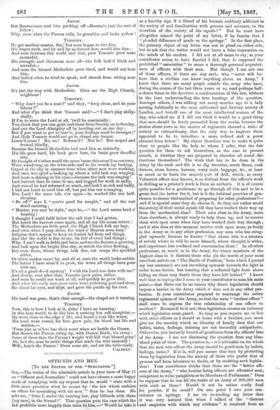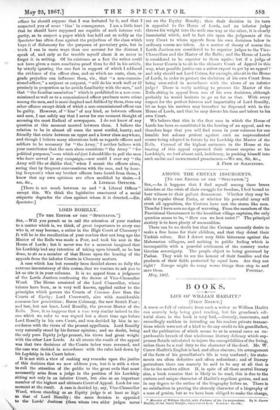OFFICERS AND MEN.
[To THE EDITOR OF THE "SPECTATOR."]
EIR,—The writer of the admirable article in your issue of May 11 on "Officers and Journalists" could not have chosen a more happy mode of complying with my request that he would "state with a little more precision what he meant by the law which cashiers an officer for associating with his men" than he has done. He asks me, "Dare I, under the existing law, play billiards with them [my men] in the Strand?" That question puts the case which the law prohibits more happily than mine to him,—" Would he take it
Ias a healthy sign if a friend of his became suddenly addicted to the society of and familiarities with grooms and servants, to the desertion of the society of his equals ? " But he must have altogether missed the point of my letter, if he fancies that I "pleaded difference of grade as the apology." In the first place, the primary object of my letter was not to plead on either aide, but to ask that the writer would not leave a false impression on the minds of his readers. I did not at all mean to say, as your contributor seems to have fancied I did, that he supposed the prohibited " association " to mean a thorough personal acquaint-. ance of officers with their men. But though I am not one of those officers, if there are any such, who "never will be- lieve that a civilian can know anything about an Army," I know that there are many people outside the army who have, during the course of the last three years or so, read perhaps half- a-dozen times in the Spectator a condemnation of this law, without in the least understanding the true bearings of the question. Amongst others, I was talking not many months ago to a lady moving habitually in the most cultivated and literary society of London, and herself one of the most intellectual women of the day, who asked me if I did not think it would be a good thing that men should be freely promoted from the ranks, because the stories about rows in the messes of regiments showed a state of society so extraordinary, that the only way to improve them appeared to be to introduc3 a more refined and a purer element from below." My object therefore was to make it quite clear to people like the lady to whom I refer, that the fair question for them to ask themselves, as the case at present stands, is whether they are prepared to abandon all social dis- tinctions themselves ? The work that has to be done in the Army by the rank and file is to dig trenches, scrub floors, cook dinners, clean horses, harness, carry coals, baggage, &c., at least as much as to learn the manual part of drill, which, as every Volunteer officer now knows, is as distinct from the officer's work in drilling as a printer's work is from an author's. It is of course quite possible for a gentleman to go through all this and to be a great deal the better for it, but is it the habitual practice of gen- tlemen to choose that method of preparing for other professions ?— and if in special cases they do choose it, do they not rather avoid the society of their social equals till they have worked their way up from the mechanical class? Their own class in the Army, more than elsewhere, is always ready to help them up, and to receive them with open arms when they have worked their way through ; and it also does at this moment receive with open arms, as freely in the Army as in any other profession, any man who has strug- gled upwards because he knows "that above him is a stratum of society where he will be more himself, where thought is wider, and experience less confined and conversation freer." In all other professions, as much as in the Army, the wisest members of the highest class in it distrust those who (in the words of your most excellent article on "The Battle of Position," from which I quoted my last sentence) are not stretching upwards towards the light in order to see better, but trusting that a reflected light from above falling on them may dazzle those they have left behind." 1 know well that in saying this I seem to your contributor to miss his main point,—that there can be no reason why direct legislation should impose a barrier in the Army which it does not in any other pro- fession. Is your contributor prepared to rearrange the entire regimental system of the Army, so that the term "brother officer" shall cease to express the true relationship of one officer to another? Because if he is not, then legislation creates an intimacy which legislation must guard. As long as you require me to live with other officers as I should at home with a brother, you must give me the security which an identity of family does that our habits, tastes, feelings, training are not incurably antipathetic. Otherwise, you instantly banish all gentlemen from the officers' lists of the Army. I am not discussing the question from any blue- blood point of view. The question is, —is it advisable on the whole that the men who officer the Army should be gentlemen by habits, feelings, tastes ? If it is, will you secure that best by protecting them by legislation from the society of those who prefer that of grooms and farm labourers to theirs, or by omitting such legisla- tion? Your contributor thinks that those are the "better offi- cers of the Army," "who besides being officers are educated men, competent to write pamphlets or be Members of Parliament." Does he suppose that he can fill the ranks of an Army of 200,000 men with such as these ? Would it not be rather costly food for powder, if he could? On one point I owe your con- tributor an apology. I see on re-reading my letter that it was very natural that when I talked of the "distrust and suspicion with which any evidence" is received from an
officer he should suppose that I was irritated by it, and that I suspected you of some 'bias' in consequence. I am a little hurt that he should have supposed me capable of such intense vul-
garity, as to suspect a paper which has held out so nobly as the Spectator has often done against the prejudices of the class which
buys it of dishonesty for the purposes of pecuniary gain, but in truth I can in more ways than one account for the distrust I speak of, and only so far trouble myself about it as never to forget it in writing. Of its existence as a fact the writer could not have given a more conclusive proof than he did in his article, by utterly ignoring the one fact in support of which I adduced the evidence of the officer class, and on which no caste, class, or grade prejudice can influence them, viz., that "a non-commis- sioned officer," a serjeant or corporal, "will do his work well or ill precisely in proportion as he avoids familiarity with the men," and that "the familiar association" which is prohibited to a non-com- missioned as well as to a commissioned officer produces more crime among the men, and is more despised and disliked by them, than any other offence except drink of which a non-commissioned officer can be guilty. However, of "bias" of any kind, as between officers and men, I can safely say that I never for one moment thought of accusing the most Radical of newspapers. I do not know of any question at this moment mooted between them. I believe the relation to be in almost all cases the most cordial, hearty, and friendly that exists between an upper and a lower class anywhere, and though I believe many alterations both as regards officers and soldiers to be necessary for "the Army," I neither believe with your contributor that the men alone constitute " the Army" "for political purposes,"—on which subject I should like to poll the men who have served in any campaign,—nor could I ever say "the Army will like or dislike that," when I meant the officers alone, seeing that by frequent conversations with the men, and by hear- ing frequently what my brother officers have heard from them, I know that my own opinions are often modified by theirs.—I [There is not much between us and "A Liberal Officer" except this. We think the legislative enactment of a social etiquette degrades the class against whom it is directed.—En. Spectator.]































 Previous page
Previous page